Why Superhero Movies Suck, Part I
An unimpeachable authority[1] offers an irrefutable hypothesis.
Post by Mark Gallagher, University of Nottingham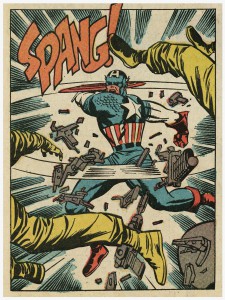
This post continues the ongoing “From Nottingham and Beyond” series, with contributions from faculty and alumni of the University of Nottingham’s Department of Culture, Film and Media. This week’s contributor, Mark Gallagher, is an Associate Professor in the department. Today’s entry is the first in a two-part post, with the conclusion appearing tomorrow.
As the 2015 summer movie season winds down, let this modest scholar now go on record as saying I hate superhero movies.[2] Clearly this is a headline-worthy news flash: another snobbish egghead rails against consumerist popular culture. Beyond trying to prove that such a view is at all novel or should matter to anyone, I have worked to develop some kind of empirically sound hypothesis, or at least a not totally argumentatively unsound one. What follows is a five-point screed (prevented by blogging convention from being a 500-point screed, though even this condensed rant may test the limits of readers’ patience). It’s no Defence of Poesy, but read on anyway.
1. Superhero movies repackage subcultural esoterica and sell it back to us in bloated, unrecognizable form. Or, speaking personally, movies such as 2012’s The Amazing Spider-Man, the 2013 superhero sequel Thor: The Dark World, and this year’s repackaged Fantastic Four cynically monetize my childhood objects of wonder. Did the baby boomers, I wonder, feel this way when the 1960s were endlessly repurposed for later generations’ consumption? Maybe they found themselves in a warm cocoon of familiar pop cult as the world around them evolved, both in and not in their own image. As for me, when confronted with entertainment spaces and referents repurposing youth-centric popular culture from deep in the past century, I feel I’m inhabiting an adolescent dystopia far more disturbing than anything presaged in Lord of the Flies (1954) or Wild in the Streets (1968). Message to Paramount, Columbia, Fox, Universal, Warners and Disney (and of course, Marvel Studios): please stop.
Or if not, let the rest of us submit, with or without protest. Earlier this year, Ta-Nehisi Coates, award-winning journalist and student of systemic power imbalances, gave an interview to New York magazine published in print as “The Superheroes Won.” Coates flags up comics’ familiar selling points for progressives—Marvel has long had more than zero black characters, and even a Native American X-Man for five minutes in the 1970s—but says little about the grindingly market-centric logic now animating corporate rights-holders, or the fairly small slice of the population that actually reads comic books. (Sources indicate that comic-book sales have risen in recent years though still speak chiefly for and to white men.)
On superhero comics and films, Coates does make a plea for the unmoving image, arguing that “superheroes are best imagined in comic books.” He continues:
The union between the written word, the image, and then what your imagination has to do to connect those allows for so much. I always feel like when I see movies, I’m a little let down by the [digital] animation. […] Avengers movies will always disappoint me. X-Men [movies] will always disappoint me. […] I feel sorry for people who only know comic books through movies. I really do.
I share Coates’ sentiments and would go further to address the ways this production trend infects larger constituencies, including film journalists and reviewers who labor to accommodate it. A popular coping (read: denial) strategy in this regard is to tune out corporatism in favor of ostensibly utopian fandoms. Reporting on this year’s consumer showcase Comic-Con (which not that long ago was a glamour-free used-collectibles bazaar), the New York Times‘ A.O. Scott remarks of comics and superhero culture that “What were once subcultural pursuits have conquered the mainstream.” He continues: “What was once a body of esoteric lore is now a core curriculum, and what was once a despised cult is now a church universal and triumphant.”
Would that I could join in Scott’s even-handed, or mostly celebratory, appraisal. Corporate product has undoubtedly spawned legitimate fan cultures that allow for myriad forms of self-expression and contingent identity formation. In moving comics materials from dispersed subculture to the center of a globalized monoculture, though, studios and their corporate parents dilute the artistic and political qualities that accompany subcultural production and circulation. The 2000s and 2010s wave of comic-book adaptations, particularly the as-yet inexhaustible roster of Marvel films both before and after the company’s 1999 acquisition by media giant Disney, sharply limits opportunities for creativity and imagination on the part of both producers and receivers. Ironically or not, superhero films’ outsize scales foster an inverse degree of imagination (though Dumb Drum‘s sweded trailers are pretty wonderful). Which leads into my second point…
2. Superhero movies distort the scale of their modest origins. At the time of Disney’s purchase of Marvel, Disney chief Robert Iger claimed that “Marvel’s brand and its treasure trove of content will now benefit from our extraordinary reach.” I don’t know if he then let out a maniacal laugh, or spoke those words in an ominous Darth Vader voice, but it sounded portentous to me. Five years later, the gifted, and highly opinionated comics writer-creator Alan Moore observed that “I found something worrying about the fact that the superhero film audience was now almost entirely composed of adults, men and women in their thirties, forties and fifties who were eagerly lining up to watch characters and situations that had been expressly created to entertain the twelve year-old boys of fifty years ago.” Moore muses further that “this embracing of what were unambiguously children’s characters at their mid-20th century inception seems to indicate a retreat from the admittedly overwhelming complexities of modern existence.” (An odd claim, perhaps, coming from a professed black-magic practitioner, but a notable point nonetheless.)
Moore’s charge could be leveled too at any film since the 1890s adapted from children’s stories, fairy tales, newspaper cartoons and more. Moore in this instance ignores comic books’ expanding audiences—comics were of course popular among soldiers in the 1940s and 1950s, and beginning in the second half of the 1960s, increasingly among university students and eventually graduates, to name just a few groups beyond preteen boys.
Still, his remarks indicate the degree to which a decidedly low-budget cultural form with discrete readerships became, in glossier cinematic form, not just legitimate but omnipresent. The Onion tweaked this emerging sensibility, and the increasingly recognizable figure of the Gen-X comic-book nerd, in the still-novel headline “Area Man Has Far Greater Knowledge Of Marvel Universe Than Own Family Tree” (a cautionary tale for those of us who also, like the article’s Area Man, can better gloss comics chronology than our family medical history).
Area Man’s pop-cultural literacy may now pay modest dividends in the form of semi-useless knowledge deployable in film consumption, though he may have to divest himself of any emotional attachments to familiar characters and storylines. Or for maximum outrage, he could curl up with Iron Man 3 (2013), which not only offered up the dismal cliché of a precocious orphan boy who helps our super-inventor hero get his mojo back after a first-act crisis but also tramples on the legacy of the armored character’s longest-running adversary, the Mandarin.
Apparently not seeking to offend Chinese audiences with the Cold War Orientalism of the comic-book Mandarin—instead, it was superfluous scenes only appearing in the mainland-Chinese release that roiled audiences there—the filmmakers reimagine the character as a connotative Arab terrorist.
The film does not explain why this nowhere-near-Chinese foe would be called “the Mandarin,” but it matters little, as this Mandarin turns out to be nothing but a for-hire actor with no integrity. Perhaps Ben Kingsley—excuse me, Sir Ben—appreciated the meta-joke here. So much for the fiendish Mandarin as comics readers had known him, though.
I don’t mean to suggest that textual fidelity is an essential criterion of judgment. In any case, film adaptations of comic books are not really comparable to serial comics anyway. Abundant film sequels aside, the recent wave of superhero television adaptations, such as Netflix’s atmospheric, psychologically-minded Daredevil (2015–) or the CW’s vigilante family melodrama Arrow (2013–), more closely match comics’ serial narrative form. As preconceived event movies, superhero films mirror the event comics Marvel and DC began publishing extensively in the 1960s—miniseries, giant-size issues, annuals that culminated epic serial storylines, and the like. Reviewing this year’s Avengers: Age of Ultron in Sight and Sound, Kim Newman reminds us that “these get-togethers feel like comic-book annuals or crossover events,” packing the screen (or page) with minor characters and subplots (most of which take us to other films or television series for completion, or help fill out toy-store shelves with expanded merchandise lines).
Why is Age of Ultron 141 minutes long? Not only because of its closing credits (clocking in at a mere 7 ½ minutes), but also because of its padding with character subplots that will continue in later films and TV series. Why does Thor depart mid-film for a bath in mystical waters? We may never know (or need to), though the film’s editing by committee and focus group apparently played some part. Even shortened from director Joss Whedon’s over-three-hour pre-release cut, the film’s surfeit of story compels viewers to search for explanations in other Marvel franchise film and TV output, if not diverting us back to the characters’ comic-book sources.
Comics fans have tended to read annuals more out of duty than enthusiasm, hoping for resolution of protracted storylines rather than nuance and narrative depth.  Multiplex patrons may approach superhero movies with the same attitude, but lacking any extended-chronology alternative aside from derivative minor-character tie-ins such as ABC’s brand-named Marvel’s Agents of S.H.I.E.L.D. (2013–). Even this might be less objectionable than the parallel permanent-first-issue trend, with characters’ origins retold in slightly altered form with each successive reboot. (With the Fantastic Four’s 1961 first issue filmed three times since 1990 with ever-younger casts, I await 2022’s Fantastic Four Infants, with uniforms to match.)
Multiplex patrons may approach superhero movies with the same attitude, but lacking any extended-chronology alternative aside from derivative minor-character tie-ins such as ABC’s brand-named Marvel’s Agents of S.H.I.E.L.D. (2013–). Even this might be less objectionable than the parallel permanent-first-issue trend, with characters’ origins retold in slightly altered form with each successive reboot. (With the Fantastic Four’s 1961 first issue filmed three times since 1990 with ever-younger casts, I await 2022’s Fantastic Four Infants, with uniforms to match.)
The fundamental distortion of superhero films is one of scale. The superhero comic books of the late 1930s to early 1980s that form the basis for contemporary films (in the most recent vintage, last year’s X-Men: Days of Future Past adapts a 1980 storyline, and the Guardians of the Galaxy first appeared in comics in 1969, though last year’s film adaptation derives from a 2008 miniseries version of the group) were produced by small groups of men (and a handful of women) laboring over drafting tables in low-rent offices or spare bedrooms.
Despite films’ occasional nods to comic-book compositions in action set pieces, a good deal more than the Benjaminian aura is lost when this artisanal work becomes the province of thousands of software technicians working in discrete teams on modular tasks. And back in comic-book world, Marvel now milks the long-ignored Guardians of the Galaxy characters for all they’re worth, with at least eight different spinoff comics series under way or announced. It’s hard to feel anything but cynical about this short-sighted franchise stewardship.
Return tomorrow for the gripping Part Two of this two-part post.
[1] For the record, I have given a lot of time to superheroes so can claim more than passing knowledge of the subject. If any value lies in asserting the depths of my interest, let me note that I am the proud owner of somewhere in the neighborhood of 7,000 comic books, including nearly all of Marvel’s 1970s output and beyond, and enough DC, Archie and indie comics to dampen my marriage prospects forever.
[2] This is not to say that certain forms of popular entertainment do not merit critical attention. I remain a proud contributor to the upcoming anthology The Many More Lives of the Batman (ed. Roberta Pearson, William Uricchio and Will Brooker, BFI/Palgrave Macmillan, forthcoming). Stimulation and repulsion apparently are not mutually exclusive.

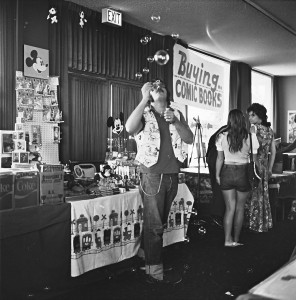
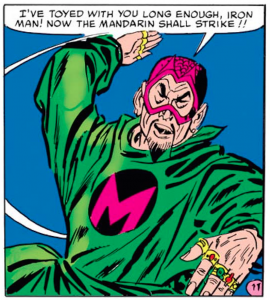
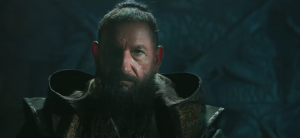
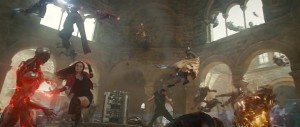
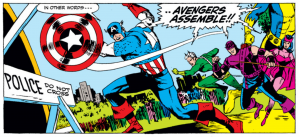


I’ve seen the Iron Man movies and had not read the comics; can you help me understand what was interesting about the Mandarin in the comics? The reveal — that the Mandarin in IM3 was our own military-industrial complex screwing with us using racist stereotypes, not a racialized Other — was a big relief to the Marvel fans I know. But maybe I am missing something about what was particularly interesting about the comics Mandarin.
Thanks for your response, Sumana. To answer your question in brief, I’d say the Mandarin’s appeal lies largely in his iconicity–as a long-running character and also as a mirror image of the Iron Man character. The 1960s Iron Man functions as a “good” avatar of the Cold War military-industrial complex, opposed to the “bad” avatar the Mandarin, who embodies with his technology-produced powers (a set of high-tech rings, each with a different lethal power) a conflated Soviet/Chinese Communist threat. The Mandarin of yore is indeed an extension of the racist Fu Manchu caricature, but he also had agency (if with de facto government backing) and was notably the only East Asian face in comic books of his heyday. The film version not only throws East Asianness to the curb, it also redefines the character as merely a front for a white villain, this one, if memory serves, an aggrieved nerd (played by Guy Pearce) jilted by protagonist Tony Stark in formulaic “what’s his motivation?” backstory. So that sense of nonwhite agency, while it squared with racist constructs of Asiannness, is entirely abandoned in the film (or is handed off to the superfluous Chinese minor characters). What could’ve been a provocative reimagining of the Mandarin as an ambivalent figuration of Chinese global power becomes instead one more aspect of the “property” thrown under the bus.
Thanks for the explanation, Mark. I appreciate the context.
Mark, there seem to be quite a few points in your essay that posit personal opinions as universal truths. And while I have a lot of sympathy with your position as an apparent comic book fan seeing your beloved fan objects used and reused, adapted and transformed, I’m not sure your judgmental, if not elitist, language serves your argument well.
To argue for any sense of authenticity in a medium that regularly reboots itself and creates alternate worlds at the drop of a hat seems strange. To pity us poor fools who only know the characters through the movies resonates with the way literary studies has long looked down on filmic and televisual adaptations, and that somehow feels wrong to me. To blame the decline of comic studies (if that indeed is true) to blockbuster movies seems to create causation among a variety of correlated issues, and personally I’m not sure that the depletion of subcultural capital is really to be laid at the feet of Spiderman and Superman or if there are a multitude of other things at work.
But then you know all that, and you’ve chosen to write a polemic nevertheless, I assume trying to oversell your argument in order to get across some of the very clear frustration you, a longtime comic fan feel about the current popularity of at least some of these films. I can’t help but note an undertone of the “not real fans” narrative that we all feel when our favorite underground X suddenly becomes popular. But as academics, we should also be self aware enough to question this nostalgia.
I think what I take most issue with, however, is the following: In moving comics materials from dispersed subculture to the center of a globalized monoculture, though, studios and their corporate parents dilute the artistic and political qualities that accompany subcultural production and circulation. The 2000s and 2010s wave of comic-book adaptations … sharply limits opportunities for creativity and imagination on the part of both producers and receivers. Ironically or not, superhero films’ outsize scales foster an inverse degree of imagination.
As a fan fiction scholar who happens to be active in MCU, I’d beg to differ. Yes, we can debate how subversive and subcultural fan fiction and fan art and fan vids ultimately are, but I’m pretty certain we can’t debate the sheer creativity that the Marvel films (in all their glorious failure on many issues) have spawned, such as (to list a tiny fraction of the daily output on various platforms) this vid or this, this tumblr or this one, or the more than 100K stories tagged as Marvel Cinematic Universe on AO3
I appreciate the thoughtful critique, Kristina. I hope as you note that the tone of my piece indicates that some of its claims are fundamentally indefensible, particularly given (as you note too) the breadth of fan production. My subjective view is that textual forms whose authorship can be ascertained do possess some form of integrity that I see eroding, based on the studio filmic evidence. I recognize the limits of that view, and the elitist discourses with which it can merge. I’m not a student or scholar of fandom (as evidence of my fossil status, I hadn’t heard of AO3), but I hope some of the stories there find ways to slash up the thoroughly corporatized Marvel world, to add many more women and people of color (other than green) into the mix, and to avoid impulses to render “epic” effects in prose form.